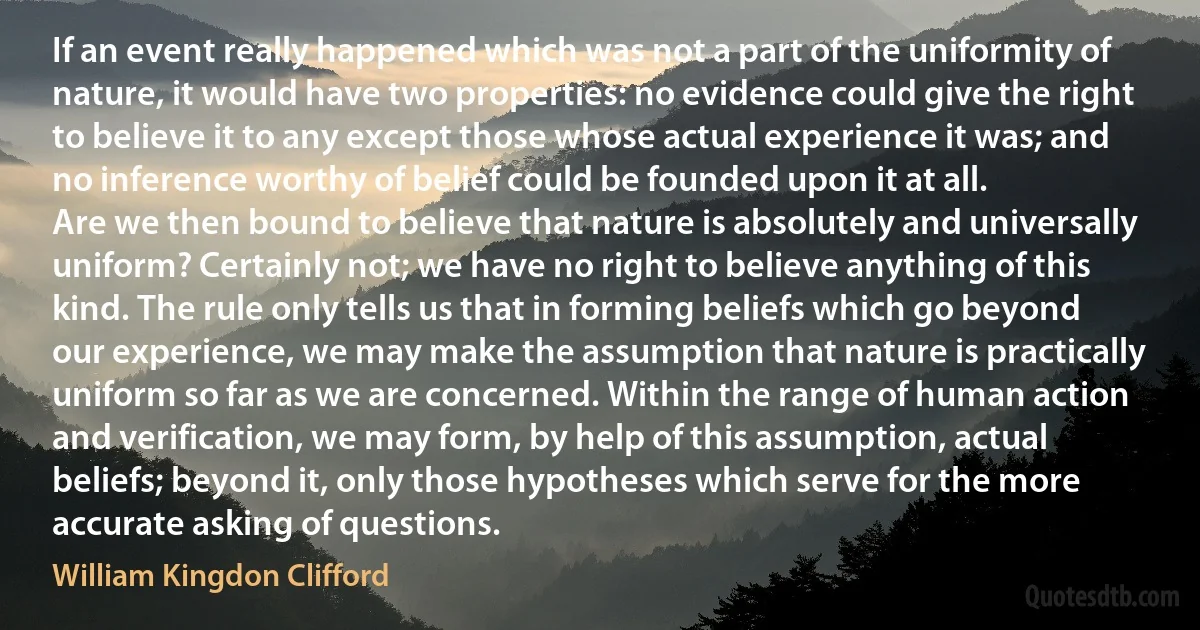
If an event really happened which was not a part of the uniformity of nature, it would have two properties: no evidence could give the right to believe it to any except those whose actual experience it was; and no inference worthy of belief could be founded upon it at all. Are we then bound to believe that nature is absolutely and universally uniform? Certainly not; we have no right to believe anything of this kind. The rule only tells us that in forming beliefs which go beyond our experience, we may make the assumption that nature is practically uniform so far as we are concerned. Within the range of human action and verification, we may form, by help of this assumption, actual beliefs; beyond it, only those hypotheses which serve for the more accurate asking of questions.
William Kingdon CliffordRelated topics
action anything asking assumption believe beyond bound experience far form forming help human hypothesis inference kind nature right rule serve uniformity worthy verification questionsRelated quotes
Many facts have lately transpired which tend to overthrow the hypothesis that heat is itself a body, and to prove that it consists in a motion of the ultimate particles of bodies. If this be so, the general principles of mechanics may be applied to heat; this motion may be converted into work, the loss of vis viva in each particular case being proportional to the quantity of work produced.
These circumstances, of which Carnot was also well aware, and the importance of which he expressly admitted, pressingly demand a comparison between heat and work, to be undertaken with reference to the divergent assumption that the production of work is not only due to an alteration in the distribution of heat, but to an actual consumption thereof; and inversely, that by the expenditure of work, heat may be produced.

Rudolf Clausius
It is always easy to blame the state and the men in uniform. But Islamic terror essentially does not emanate from uniforms and state power, but from a belief system which even the ordinary people have been fed. That is why a lot of Islamic terror never gets recorded by human-rights organizations like Amnesty International. A Christian Pakistani friend complained to me that Amnesty had not spoken out against the religious persecutions in his homeland, even when these are a grim and undeniable reality. The fact is that much of this persecution and discrimination is not ordered by the state (the type of culprit with which Amnesty is familiar), but is a spontaneous attitude among sections of the Muslim population, egged on by nothing except the omnipresent Islamic doctrine.

Koenraad Elst
"I exist" does not follow from "there is a thought now." The fact that a thought occurs at a given moment does not entail that any other thought has occurred at any other moment, still less that there has occurred a series of thoughts sufficient to constitute a single self. As Hume conclusively showed, no one event intrinsically points to any other. We infer the existence of events which we are not actually observing, with the help of general principle. But these principles must be obtained inductively. By mere deduction from what is immediately given we cannot advance a single step beyond. And, consequently, any attempt to base a deductive system on propositions which describe what is immediately given is bound to be a failure.

Alfred Jules Ayer
But it will always be impossible to harmonize justice and war. It is always possible to purchase materials with money, but patriotism can not be purchased. Unless the people are willing to defend their country because of their belief in it, because of their affection for it, and because it is representative of their home, their country can not be defended. If we are looking for a more complete reign of justice, a more complete supremacy of law, a more complete social harmony, we must seek it in the paths of peace. Progress in these directions under the present order of the world is not likely to be made except during a state of domestic and international tranquility. One of the great questions before the nations to-day is how to promote such tranquility.

Calvin Coolidge
The third and intermediate kind of instruction, which connects the first two... relates to the application of scientific principles to practical purposes. It qualifies the student to plan a structure or a machine for a given purpose, without the necessity of copying some existing example, and to adapt his designs to situations to which no existing example affords a parallel. It enables him to compute the theoretical limit of the strength or stability of a structure, or the efficiency of a machine of a particular kind-to ascertain how far an actual structure or machine fails to attain that limit-to discover the cause of such shortcomings-and to devise improvements for obviating such causes; and it enables him to judge how far an established practical rule is founded on reason, how far on mere custom, and how far on error.

William John Macquorn Rankine
